Search here
Newspaper
Search here

Arab Canada News
News

Published: April 21, 2023
Islamophobia and violence against Muslims are widespread and deeply rooted in Canadian society, according to preliminary findings of a committee affiliated with the Canadian Senate tasked with studying this issue.
The Human Rights Committee found that Muslim women who wear the hijab, including Black women in particular, are the most vulnerable to Islamophobia and that confronting Islamophobia in a variety of public spheres is challenging.
"Canada has a problem," said the committee chair, Senator Salma Ataullahjan, in a phone interview with the Canadian Press.
She also added that the problem is worse than current statistics indicate.
The committee found that many Muslims across Canada live in constant fear of being targeted, especially if they have previously experienced an Islamophobic attack or witnessed such an attack or lost a loved one to violence.
Figures released last month by Statistics Canada indicated that hate crimes against Muslims reported to the police increased by 71% between 2020 and 2021. The crime rate reached eight incidents per 100,000 Muslim residents in Canada.
It is noted that this committee’s work began in June 2021, following the death of four members of a Muslim family in London, Ontario, after they were run over by a small truck driver while out on an evening walk. The driver was charged with a terrorist-motivated murder.
Committee members, including senators, analysts, interpreters, and other staff, traveled to Vancouver, Edmonton, and Quebec and moved within the Greater Toronto Area to talk to Canadians who attend mosques, Muslims who were victims of attacks, teachers, doctors, security officials, and others.
In this regard, Ataullahjan said that the summaries of those conversations and testimonies are being compiled into a report that the committee began drafting this week.
The Pakistani-born senator also added that the final version of the report, expected to be published in July, will include recommendations on what can be done to combat Islamophobia and what the government can do to better support victims of attacks.
Among the findings reached by the committee is the observation that attacks against Muslims often occur on the street and appear more violent than those targeting followers of other religions, according to Ataullahjan.
Analysts and experts interviewed by the committee also said that the rise of far-right hate groups and anti-Muslim groups is among the driving factors behind attacks against Muslims.
Comments